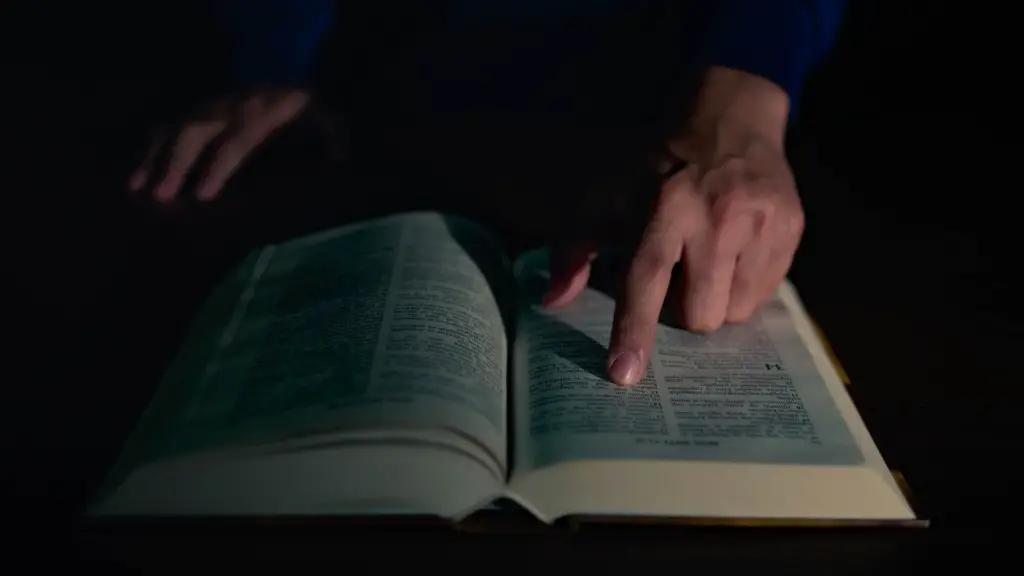The Bible is an ancient religious text which provides insight into the philosophy of life and how to seek holiness and communion with God. One of the themes contained in the Bible that is particularly interesting is sorcery. While the Bible condemns sorcery in the strongest terms, it nonetheless provides an articulate and detailed understanding of the practice. This article aims to explore sorcery in the Bible, offering an understanding of what it is and its implications.
Sorcery in the Bible is often referred to as witchcraft, though the two are not necessarily the same thing. Witchcraft is a practice that makes use of supernatural powers and rituals to achieve a desired end, while sorcery is more focused on gaining information or cultural control. In the Bible, sorcery is typically referred to as “enchantment” or “sorcery”, and is an activities used to gain supernatural powers or to bring physical harm to others.
Sorcery in the Bible is strongly condemned. It is regarded as one of the greatest sins and those who practice it are threatened with dire consequences. In Deuteronomy 18:10, the Bible declares: “There shall not be found among you anyone who makes his son or daughter pass through the fire, or one who practices witchcraft, or a soothsayer, or one who interprets omens, or a sorcerer.” In Exodus 22: 18, it states: “You shall not allow a sorceress to live.” These passages demonstrate how seriously the Bible views sorcery.
This condemnation of sorcery in the Bible is based on the understanding that it seeks to manipulate the will of God – or at least, to shape the future according to human desires or whims. In other words, the Bible views sorcery as attempting to control the forces of nature in ways that are forbidden by God. It is an attempt to usurp God’s authority and to use the power of the supernatural against God’s will.
At the same time, the Bible also acknowledges the power of sorcery and its potential uses. In Isaiah 47:9-12, the Lord says that He will let those who practice sorcery go unpunished, allowing them to practice the craft to their heart’s content: “But these two things shall come to you In a moment, in one day: The loss of children, and widowhood. They shall come upon you in their fullness Because of the multitude of your sorceries, For the great abundance of your enchantments.” This suggests that while the practice of sorcery is strongly condemned, it is nonetheless seen as having potential uses.
Thus, the Bible acknowledges the power of sorcery, while also condemning its use. A careful reading of passages from the Bible reveals that it views sorcery as an attempt to manipulate the will of God, and thus as an activity that should be avoided.
The Power of Sorcery
The Bible recognizes and even acknowledges the power of sorcery. For example, in the Book of Daniel, we see the power of sorcery at work in the famous incident of the poisoning of the king’s wine. The queen’s advisors sought to poison the king by using a magical drug, and their efforts resulted in the king becoming weak and sick. Similarly, in the Book of Exodus, the power of sorcery is used by Pharaoh’s magicians, who are able to replicate the miraculous signs and wonders performed by Moses and the Israelites.
In addition to recognizing the power of sorcery in the Bible, we can also see how it is used for both good and evil purposes. In the Book of 1 Samuel, for example, the Witch of Endor uses her powers to help Saul in a time of need. She is able to invoke the spirit of the prophet Samuel in order to better understand Saul’s fate. Similarly, in the Book of Esther, Mordecai, who has acquired the power of sorcery through his studies, is able to thwart the designs of King Ahasuerus.
The Bible, then, recognizes the power of sorcery and acknowledges its use both for good and evil purposes. On the one hand, it is a force that can be used to great effect by those who understand and can control it. On the other hand, it is also a force that can be used for malicious purposes.
The Consequences of Sorcery
The Bible makes it clear that those who use sorcery will face dire consequences. Sorcery is a serious violation of the laws of God, and so anyone who practices it will face serious repercussions. For example, the Lord declares in Exodus 22:18 that sorcerers should not be allowed to live. Similarly, in Deuteronomy 18:9-10, those who practice sorcery are threatened with the penalty of being cut off from their people.
In addition to the severe consequences outlined in the Bible, those who practice sorcery may also incur a loss of reputation among their peers and be regarded with disdain or mistrust. This is due to the fact that sorcery is often associated with evil and dark practices, as well as secret knowledge and occult powers. As such, those who practice sorcery may find themselves ostracized by their community.
The Bible also warns against the spiritual dangers of sorcery. In Ezekiel 13:18-19, the Lord condemns those “who make women weep, who employ witchcraft, and who consort with mediums”, warning that those who rely on sorcery will be cut off from His presence. Similarly, in Isaiah 19:3, the Lord warns that those who seek out the mediums of Egypt will be led astray and will be ashamed for their magical practices.
Sorcery as a Symbol
In addition to understanding sorcery in the Bible as a real practice, it is important to note that it is also often used as a symbolic representation of opposing forces. In the story of the battle between Elijah and the prophets of Baal, for example, Elijah is portrayed as the champion of the Lord, while the prophets of Baal represent the forces of false gods and evil spirits. Similarly, in the conflict between Daniel and the magicians of Pharaoh, Daniel is represented as the one who stands for God, while the magicians of Pharaoh are portrayed as those who are devoted to a false god.
Indeed, throughout the Bible, sorcery is often used to symbolize the power of evil spirits and their attempts to lead people away from the truth. Thus, when we read passages in the Bible that depict sorcery, it is important to remember that they are often symbolic of the struggle between good and evil, between light and darkness.
Modern Interpretations of Sorcery
In today’s world, the concept of sorcery is largely disregarded as primitive superstition. However, despite the fact that it is largely disregarded by modern society, there are still those who believe in the power of sorcery and the ancient knowledge that it seeks to employ.
In recent years, there has been a resurgence of interest in the occult, and many modern practitioners of magical arts use a variety of techniques, including divination, tarot reading, and astrology. While the aims of these magical arts may differ from those of ancient sorcery, they still rely on gaining supernatural power or knowledge and manipulating the forces of nature.
At the same time, there is also a growing focus on the ethical implications of the use of sorcery and magical arts. Many practitioners are focused on using their knowledge and power to help others, and to do so in a way that is sensitive to the ethical and spiritual implications of their practices. This shift in focus has been greatly influenced by contemporary spiritual and magical traditions and the emphasis they place on responsible and conscious engagement with the magical world.
Exploring the Significance of Sorcery
The study of sorcery in the Bible provides us with an opportunity to better understand the struggle between good and evil, between light and darkness. It reminds us of the power of the supernatural and of the potential consequences of using it for selfish and malicious purposes.
At the same time, studying the use of sorcery in the Bible can also provide insight into the relationship between spirituality and magic. While the Bible strongly condemns the use of sorcery and warns of its dangers, it also acknowledges the power of sorcery and its potential uses. As such, studying sorcery can help us to better understand the role of magic in spiritual belief.
Finally, exploring the concept of sorcery in the Bible can help us to gain a better understanding of how these ancient beliefs were interpreted and understood by our ancestors, and to reflect on how our own beliefs and practices might differ from those of our ancestors. In this way, exploring the concept of sorcery in the Bible can help to provide insight into our own spiritual and ethical beliefs as well as our understanding of the unseen world.





